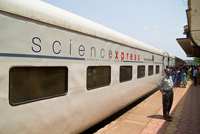|
Gandhinagar:
At a time when educationists are increasingly concerned over
students’ waning interest in science, Indian Railway’s third run of
the “Science Express” train seeks to reach out to the remote corners
of country with the aim of promoting scientific knowledge among the
masses.
Phase three of the train was flagged off on October 2 at Gandhinagar
in Gujarat by the Railway Board chairman S S Khurana, to mark the
birth anniversary of Mahatma Gandhi. The train will traverse through
55 halts covering a total of 18,000 km during the next seven months
of its journey across the country. At every halt the train will
remain stationed for about 3-5 days.
Some of these halts are located in
Ahmedabad, Aurangabad, Madgaon, Hubli, Bangalore Cantt. Mysore,
Calicut, Thiruvananthapuram, Salem town, Balasur, Dimapur, Darbhanga, Chhapra,
Amethi, Jammu Tawi, Kapurthala, Delhi Cantt, Agra Cantt, Jhansi and
Ujain.
The
exhibition on the Science Express train has been primarily developed
by Max Planck Society, Germany in collaboration with Department of
Science & Technology (DST), Government of India. The exhibition
features over 300 large format visual images, 150 video clips and
multimedia exhibits. A number of exhibits from Indian institutes
have been put up. In the current phase, it also hosts an exhibition
on Climate Change sponsored by HSBC, besides showcasing India’s
achievements in Science and Technology and the ‘Joy of Science Hands
on Lab’ of VASCSC.
|
Science Express |
|
 |
|
The fully
air-conditioned ‘Science Express’ comprises 16 coaches. It has a
mobile exhibition unit spread across 12 coaches with over 300 large
visual images. There are over 150 video clips and multimedia
exhibits throwing light on cutting-edge research and technology.
|
The first phase
was flagged off by India’s Honorable Prime Minister Dr. Manmohan
Singh and German Chancellor Dr. Angela Merkel. In its earlier two
phases, it traveled to more than 100 cities, covering over 32,000 km
across India. This innovative exhibition, which created four
National Records, received unprecedented response at all the halts
and over 35 lakh people, majority of them students, visited it.
The fully
air-conditioned ‘Science Express’ comprises 16 coaches. It has a
mobile exhibition unit spread across 12 coaches with over 300 large
visual images. There are over 150 video clips and multimedia
exhibits throwing light on cutting-edge research and technology.
Most of the exhibits have been developed by the Max Planck Society
of Germany.
The exhibits explain in detail formation of universe, glimpses of
space, black holes, galaxies, on the way to the Big Bang, our home
in the cosmos, spaceship earth, simpler cold atoms, ultra short
light, biotechnology, building blocks of life from ‘gene to
organism’, the world of senses, architecture of the mind, renewable
energy, technologies and energy sources for future, nano-cosmos, bio-engineering,
genetics, cell biology, computer applications in medicine and global
challenges among other issues. The exhibition also covers issues
like climate change, energy conservation and nutrition.
|





